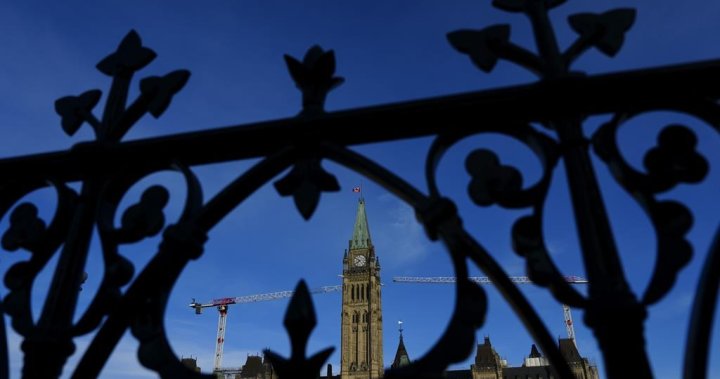
Pam Bristol from Regina is the caretaker for her 18-year-old son, David Rheault, who was born with a severe case of cerebral palsy. The term is used to describe a group of brain disorders that affect a person’s ability to move and maintain balance.
Rheault can say some words but mostly communicates with assisted technology, Bristol says.
She says she isn’t worried about being able to support her son while he lives at home, but “as an adult trying to live independently, $200 a month is a pittance.”
Despite being touted by the Liberals as the budget’s largest line item, critics say Ottawa’s investment in disability benefits announced this week doesn’t do enough to help the 1.4 million disabled people living in poverty across the country.
The federal government’s 2024 budget, tabled Tuesday, includes more details on the implementation of reforms to the Canadian Disability Benefits Act, which received royal assent last June. The initial funding envelope for the program is $6.1 billion over the first five years, and $1.4 billion annually afterwards.
The goal of this program is to provide financial support for low-income, working-age people living with disabilities. The maximum benefit is set at $2,400 annually and is estimated to go to more than 600,000 low-income people with disabilities aged 18 to 64.
The plan to offer 600,000 people with the benefit works out to $200 per month, which is about six dollars per day.

Pam Bristol (right) is pictured with her 18-year-old son David Rheault (left) at their home in Regina.
Global News
Bristol says individuals like her son need better support to live a quality life.
“David would at some point, as most adult children, would like to move out from his parents’ home. And when the time comes we will support him in that. But there needs to be good quality options. Those options are pretty scarce right now,” she told Global News.
Advocates express disappointment over disability benefit
Rabia Khedr, the director of advocacy group Disability Without Poverty (DWP), has been vocal about the limitations of the proposed benefits.
“In many cases, you can’t even pay for a round trip on public transit with that,” Khedr told Global News, referring to the allotted $200 a month.
Ottawa says the payment is meant to be a supplement to existing provincial and territorial programs rather than a replacement, but advocates were more hopeful when Ottawa committed to moving forward with a federal benefit in September 2020.
“We had our expectations tempered. We were not expecting it to be ideal out of the gate, but we were hoping that the government would honour at least the minimum model proposed by the Parliamentary Budget Office,” Khedr told Global News.
The PBO’s November report explored the cost of three hypothetical implementations of the benefit, ranging from around two billion dollars to $20.5 billion this year. The lowest cost option was an average annual benefit of $7,600 for 275,000 applicants.

Maytree, an organization aimed at looking for solutions to end poverty, releases a report each year showcasing social assistance programs in Canada. Its 2022 report suggests a single adult with a disability would be in poverty after receiving funding from provincial programs. An additional $200 a month wouldn’t be enough to bring them above the poverty line.
Kamal Khera, the minister responsible for the benefit, said Tuesday that she recognizes the fund doesn’t go far enough but she also said it lays the groundwork for change.
“This is a starting point. This is a keystone in creating a key benefit that our government has put forward. And we’re going to continue to work with provinces and territories to make sure that they get the supports that they need,” said Khera, who is the Minister of Diversity, Inclusion & Persons with Disabilities.
Finance Minister Chrystia Freeland addressed concerns about the benefit’s limitations in a press conference Friday. She said the government recognizes the challenges that people with disabilities face in Canada everyday.
“That’s why we were so glad that that’s part of this budget which invests so energetically in Canada and Canadians. We were able to make a historic investment in Canadians living with a disability. We have done more than any federal government in Canadian history and I’m glad that we’ve been able to do that,” Freeland told reporters.
Still, she says the government aspires to do more.
“This is a big step. Better is always possible in Canada. We need to keep working hard,” Freeland said.
NDP Leader Jagmeet Singh echoed critics after the tabling of the budget Tuesday, saying the benefit does not go far enough in supporting low-income people with disabilities. He said he wants to hear more from Prime Minister Justin Trudeau on his party’s concerns before supporting the budget.
“What’s the plan to address the fact that $200 a month for people with living with disabilities is insufficient. What is the plan to address those concerns? I want to hear that from the prime minister,” Singh said.

According to DWP, 41 per cent of Canadians living with disabilities are low-income, with 16.5 per cent living below the poverty line. They estimate this accounts for 1.5 million people.
The budget also proposes expanding the disability tax credit so people can deduct costs of things like having a service animal, purchasing specialized computer equipment and ergonomic chairs. This tax credit is expected to cost $1 million annually.
Canada Disability Benefit payments are slated to begin reaching people who need them by July 2025.
Khedr says she is heartbroken for the Canadians who are disappointed by the federal budget, and for those who were waiting in anticipation “of this benefit lifting them out of poverty so they don’t have to consider medical assistance in dying.”
“The government did not look into any creative ways to fund an adequate benefit,” Khedr told Global News.
For Rheault, his goal is to one day be able to enter the workforce as either a truck driver or firefighter. Bristol says it could be possible for her son, despite his motor skill challenges.
“We’re hopeful with the right kind of instruction and support that he can find work.”
— with files from Global News’ Kyle Benning, David Baxter and Moosa Imran










